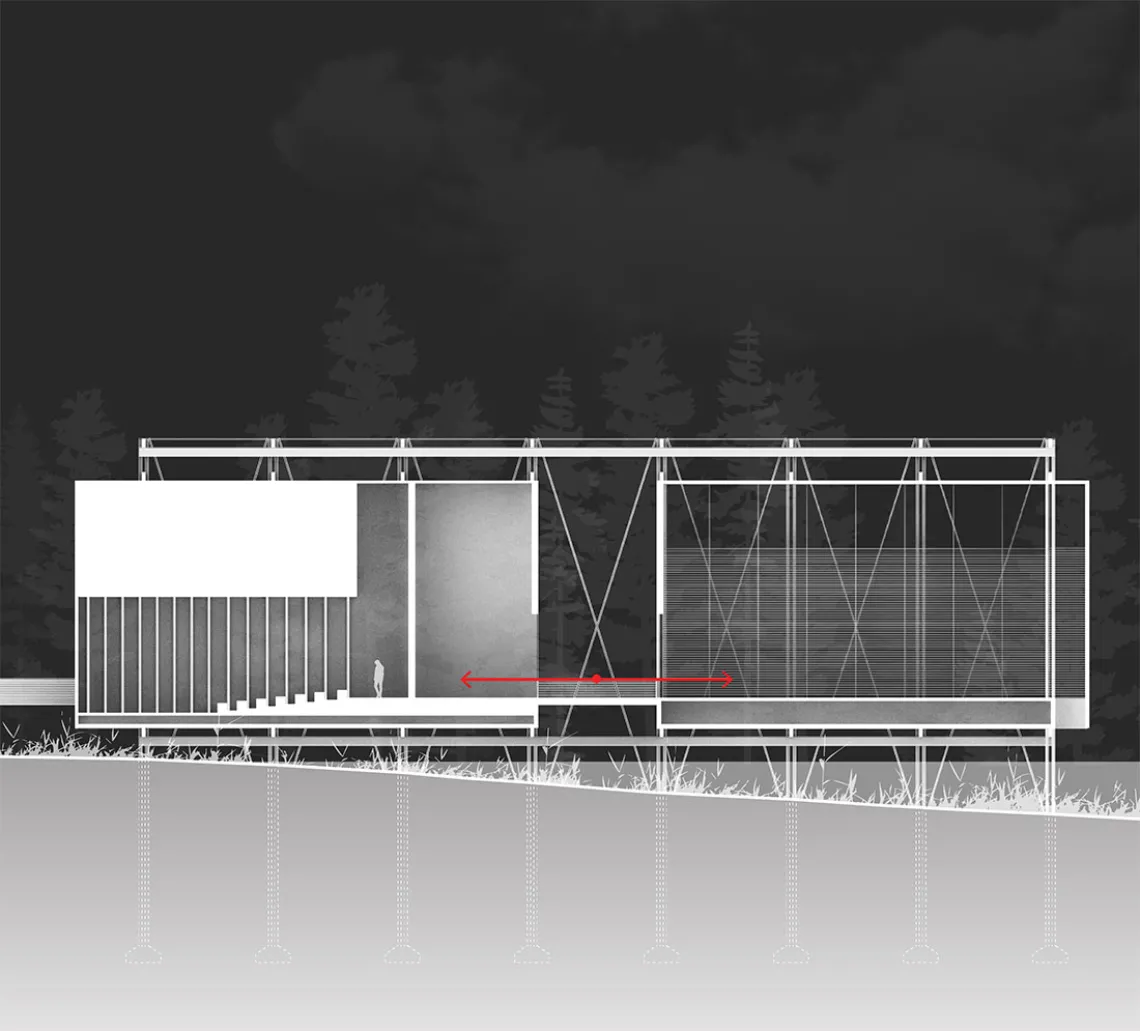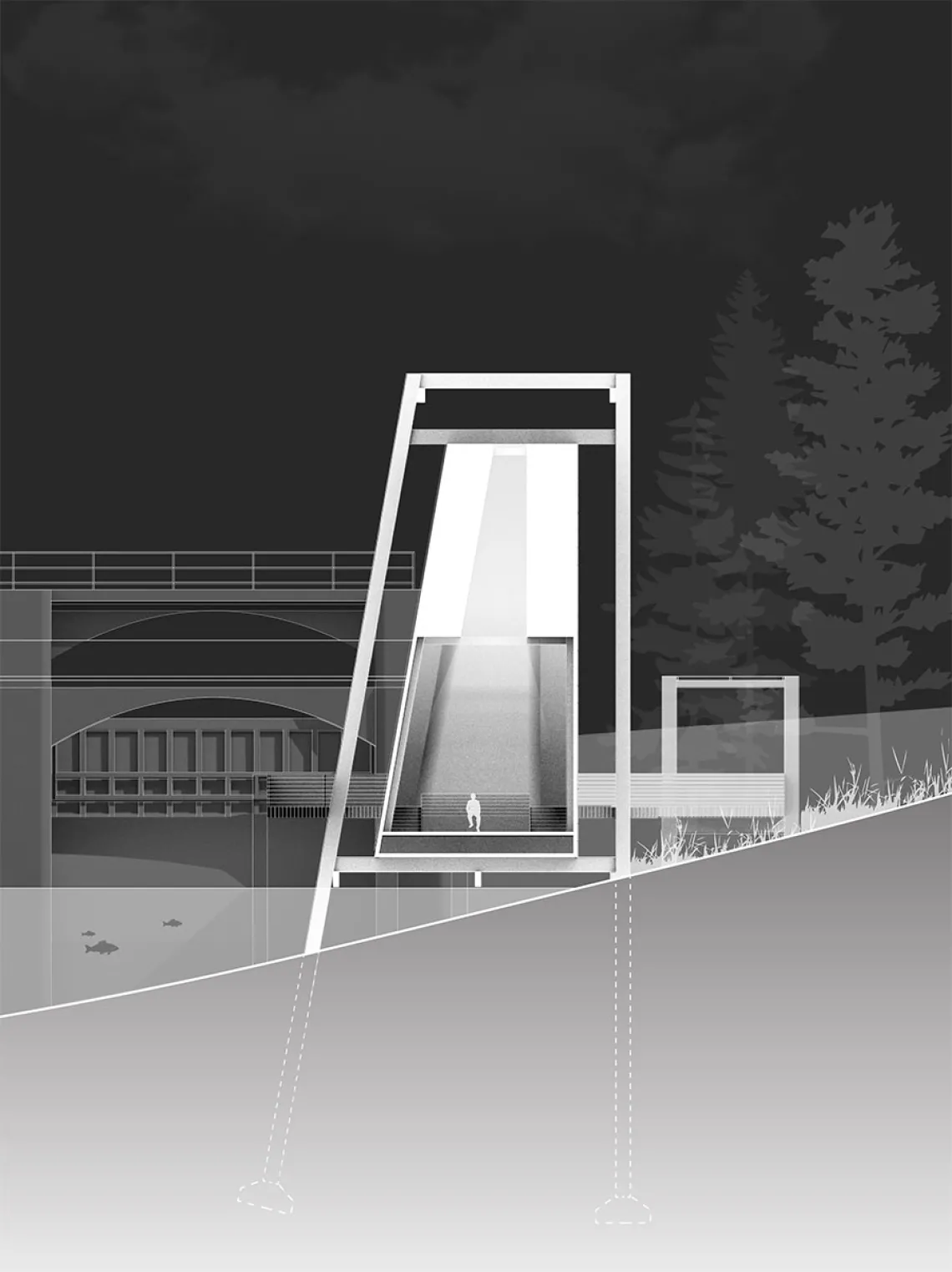Rooted in the Spirit of Place: Jenny Nguyen ’20 B.Arch

“Ending the program in a pandemic is definitely something I never anticipated,” says Jenny Nguyen ’20 B.Arch, who graduates from CAPLA’s five-year, accredited undergraduate architecture program in six weeks. “And while we’re all super bummed about finishing college this way, I’ve learned a lot of lessons.”
Among those is communicating clearly within the limits of a screen and microphone, a requirement once the university’s courses—including traditionally hands-on design studios—moved online during the COVID-19 pandemic. “Instead of seeing a project in its entirety—like in a physical pin-up—we now have to think about how projects can be communicated chronologically and linearly in a concise manner.”

Center for Information and Collaboration, designed by Jenny Nguyen in her fall fourth-year architecture studio.
Overcoming challenges is nothing new to Nguyen, who learned early on the value of hard work.
Her father immigrated to the U.S. in the mid-1970s from Vietnam, when war left the country ravaged. “He traveled thousands of miles by sea on a dangerous, overcrowded wooden boat to an unknown foreign country,” she says. Though he didn’t know the language or culture when he arrived, he “believed that through hard work and education, you can achieve anything regardless of your background or upbringing.”
That same spirit drove Nguyen, who graduated in the top 1 percent of her class in high school. “I have carried that work ethic with me through the architecture program here at CAPLA,” she says. “I view the extensive amount of work completed over the past five years as me fighting for the American dream my father pursued.”
Yet honoring her heritage runs much deeper than hard work. “My Vietnamese culture has always been an important part of my life,” she says, noting how her heritage has influenced her views in architecture. “Because I was raised by a minority family from a country that doesn’t have the type of development we have in the U.S., I understand the basic needs of people who may not have running water or plumbing or shelters capable of keeping them safe.”
Architecture must serve the underserved, she says. “Great architecture doesn’t need to be expensive or high design. It’s more about experience and craft. If it can serve a community of people who need it the most, that’s the best solution.”

Preliminary elevation drawing of the Oral Histories portion of the memorial and gallery Jenny Nguyen is designing as part of her fifth-year capstone project.
Does that perspective play into Nguyen’s architecture capstone project, as well? “Absolutely,” she says. “Architecture should root us in the spirit of the place—borrowing from the motifs of the past. This means not erasing nor replacing an area’s cultural identity, but carefully and meticulously weaving it into the present context—to create architecture that becomes an evolving record of history so that the human sense of locality and authenticity are heightened, not withered.”
Nguyen’s project, under the guidance of Associate Professor of Architecture Christopher Domin, seeks to identify and showcase—through a gallery and memorial that include oral histories and a reflection tower—how the Native and non-Native cultures of the Ballard Locks area of Seattle, Washington can coexist.
CAPLA students in the two-semester capstone studio traveled to Seattle at the beginning of the fall semester for site analysis and have developed their ideas and projects since: “My capstone is not complete but nearing the end! I’m excited to see the final project.”

Preliminary sectional drawing of the Oral Histories portion of the memorial and gallery Jenny Nguyen is designing as part of her fifth-year capstone project.
While Nguyen’s heritage influences her passion for the spirit of place, it’s the CAPLA curriculum that’s been her biggest surprise. “I love the array of tangible skills I’ve gained over the past five years,” she says. “I am able to build a house since I did a design/build studio in my fourth year. And I use tools in the shop—activities that are typically associated with men. I feel accomplished knowing that I can be an example to young girls everywhere.”
But gaining those skills—especially early in the program—may not at first seem connected to architecture. “When you start architecture it’s not readily apparent that what you’re doing in foundation studio is related.” You have to trust the process, she advises to new students. “The process teaches you how to think architecturally, how to work architecturally.”
It’s a process that has greatly benefited Nguyen, who was awarded an esteemed Safeway Scholarship her final year in the program. But her dedication to the process has taught her difficult lessons, too.
“Balancing personal life with the course workload was my biggest challenge at CAPLA,” she says. “There were times I put school ahead of my health and even my family. It’s easy to do.”
“Look after your health and family before everything else because you don’t know how much time you have. In my first year, my father was diagnosed with liver cancer. In my second year, he passed away. Less than a year later, my mother was diagnosed with lung cancer.” Nguyen and her sisters became caregivers in addition to full-time students. “That’s when I reevaluated my situation and prioritized my health and family over work.”
Health and heritage, family and work ethic, architectural process and academic excellence—the traits that define Nguyen have prepared her for a rewarding future, one rooted in the spirit of place.



